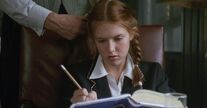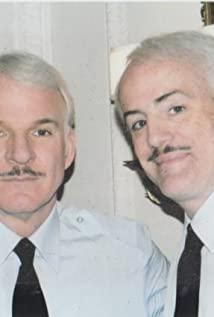The reason why I gave it four stars is because of the moral questioning that this film brings: Is it unethical for an adult male to fall in love with an underage girl in his near-future years?
After reading the original and the 1962 version, I came to this version again. I feel that the plot of the 1962 version is a bit out of line. It is estimated that those who have not read the original will feel a little confused, and Querdi is simply a cute talker, and it does not match the image of the original. In contrast, still like this version. The male and female protagonists are very suitable for the original work. Xiao Luo is simply the incarnation of a sexy goblin~ The plot is in line with the original work, and the plot is not protracted.
The inner monologue of the male protagonist in the original book still tends to love Lolita passionately and deeply. The male protagonist is indeed a pedophile. His own explanation is related to the death of his first love girlfriend. After that, just like the opening scene of the movie, he has been observing the fairies with an artistic eye to find the most charming ones. that one. At first, the male protagonist's pedophile observation method made me a little uncomfortable, but the male protagonist is still more gentleman. It was true that he married her mother for Luo's sake, and it was true that Luo wanted to get closer to her all the time, but it was also true that Luo wanted to get closer to her, but it was also true that before Luo dedicated himself to him for the first time (or Luo actively seduced him, It's hard for men who already have some ideas to hold back), he has always been bound by morality and didn't want to really hurt Luo.
In the original book, Humbert went to the summer camp to pick up Luo after Charlotte's death, and they kissed in the car: "I really didn't dare to kiss her, I touched her hot, open lips, with great reverence, A slight suck, nothing lewd; but she, in an unbearable twitch, pressed her lips hard on mine."
That night at the hotel, Humbert said after feeding Lowe an anesthetic: "I am still determined to pursue my goal of taking advantage of the dark night to secretly operate that little naked body that has been completely anesthetized without encroaching on her chastity. Repression and reverence remain my motto - even if her chastity has been slightly damaged by some teenage sexual experiences."
Since then, the male protagonist is no longer bound by morality, and has become more and more bold. He controls Luo's daily life (travel destination, making friends, drama club, watching her all the time), money, and sex. Because Luo is the only one who can rely on him, everything about this girl is controlled by the male protagonist. Of course, the male protagonist is also very good to Luo, and she can buy whatever she wants. In this deformed life, and Luo always thought that the male protagonist killed his mother just to be with him, this rebellious girl who was in her puberty had no love and affection for Humbert, and may only be impatient. And hate it.
But it is also in this kind of life (12-14 years old, 2 years) that the male protagonist should be in love with Luo over time, and he gradually fell in love with her, not only physically, but also emotionally. He has desire for her, as well as love, affection and responsibility. And Luo may just be thinking about how to get rid of him.
In the end, Lowe left the hero with the help of Queldi. The male protagonist has been searching frantically for three years. As the movie shows, there is no news of the places he has been to and the hotels he has stayed in one by one. Because the male protagonist always believed that Lo had told him that Queldi was an old lady... Eventually the male protagonist received Lo's letter, gave her money, and was saddened by Lo's confession (never loved him) Go, shot and killed Queldi, was arrested and imprisoned, died of illness, and ended a ridiculous life.
This book is Humbert's autobiography in prison, so he did not know what happened to Lowe, but he left a message: "This memoir can only be published when Lolita is no longer alive", Because "I don't think I can expose the living Lolita".
It can only be said that this story is destined to be a tragedy from the beginning. As a victim, as a victim of a ruined life, Luo has no way to fall in love with Humbert. There are too many immature misunderstandings and resentments between them combined with adolescence. If Luo really falls in love with the male protagonist, many viewers will Would have thought this was another poor Stockholm Syndrome so the author couldn't, Lo couldn't. Luo is selfish and cruel. She knows how to use her own charm to make Humbert submit to her. In this relationship, she is always active, but the male protagonist seems to be active. The moment he falls in love with her, he can only submit and unconditionally satisfy her Any request, saying "I'm sorry" over and over again, nervously guarding the heroine, three years of frantic searching, and then to the last moment of sad tears and despair at the end.
When I only knew the theme of this story, I also thought about the pedophile, a person who hates itching teeth, how can I clean it up. But after reading the original book, it is very embarrassing that the male protagonist has developed pedophilia into love, or is still in unrequited love. (In other words, if Humbert has no love for Luo, as many short reviews have written, and is just playing, the male protagonist will probably be sprayed to death...) The ending of the story is a tragedy that loses both sides. Luo, a rebellious girl, Under the guidance of Humbert, he embarked on the beginning of depravity and continued to degenerate (without leading a normal life, his three views are also distorted); and Humbert took on the moral shackles after knowing Lolita. (avoiding jc, always feeling guilty about Luo and Luo's mother), sensitive (always to prevent Lolita from running away) and desperate (knowing that Luo never loved him).
Finally, let's wrap up this long film review with Humbert's memoir at the end--
"I'm thinking of the buffaloes and angels of Europe, the enduring secrets of paint, the sonnets of the prophets, the sanctuary of art. This is the only eternity you can share with me, my Lolita."
View more about Lolita reviews











